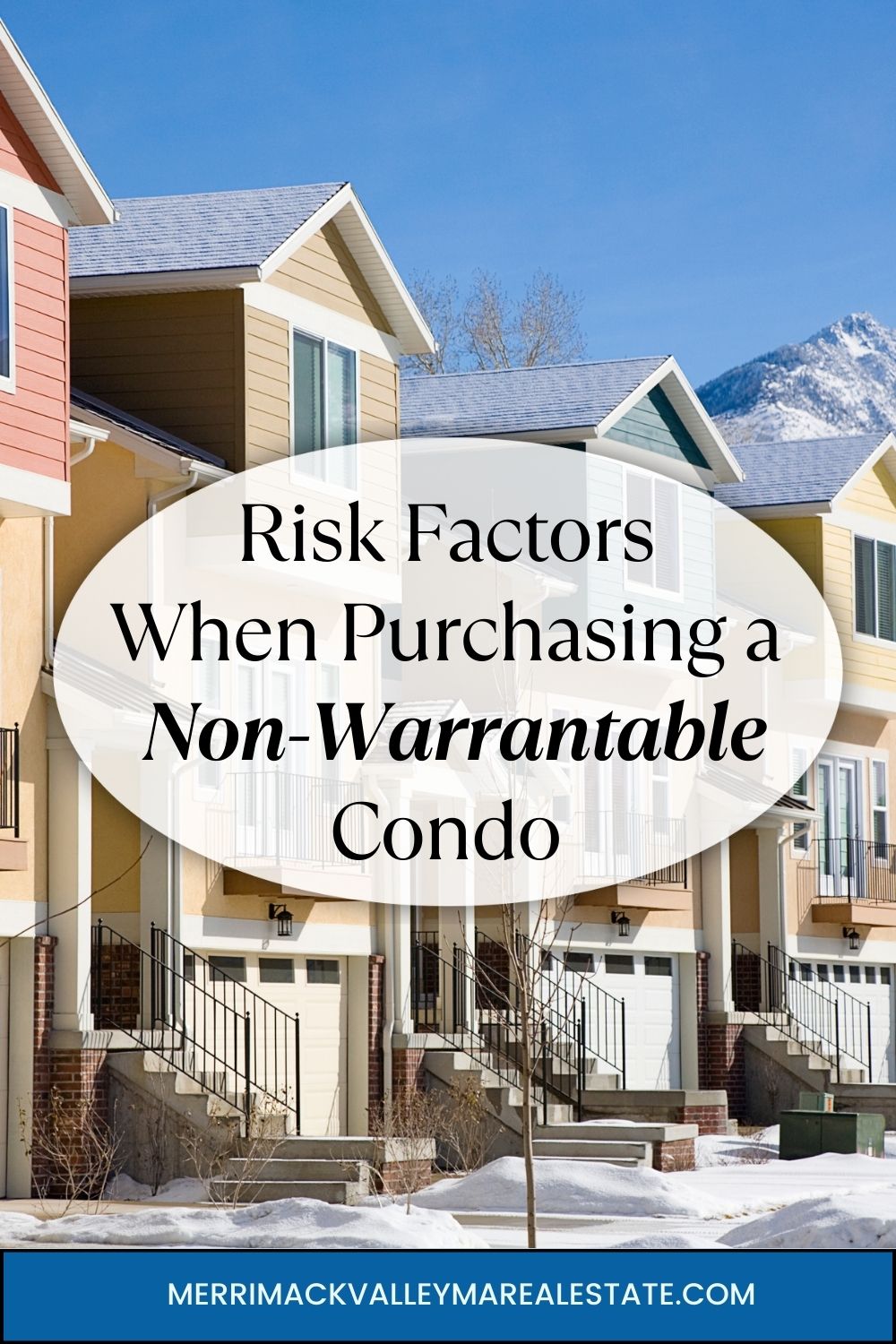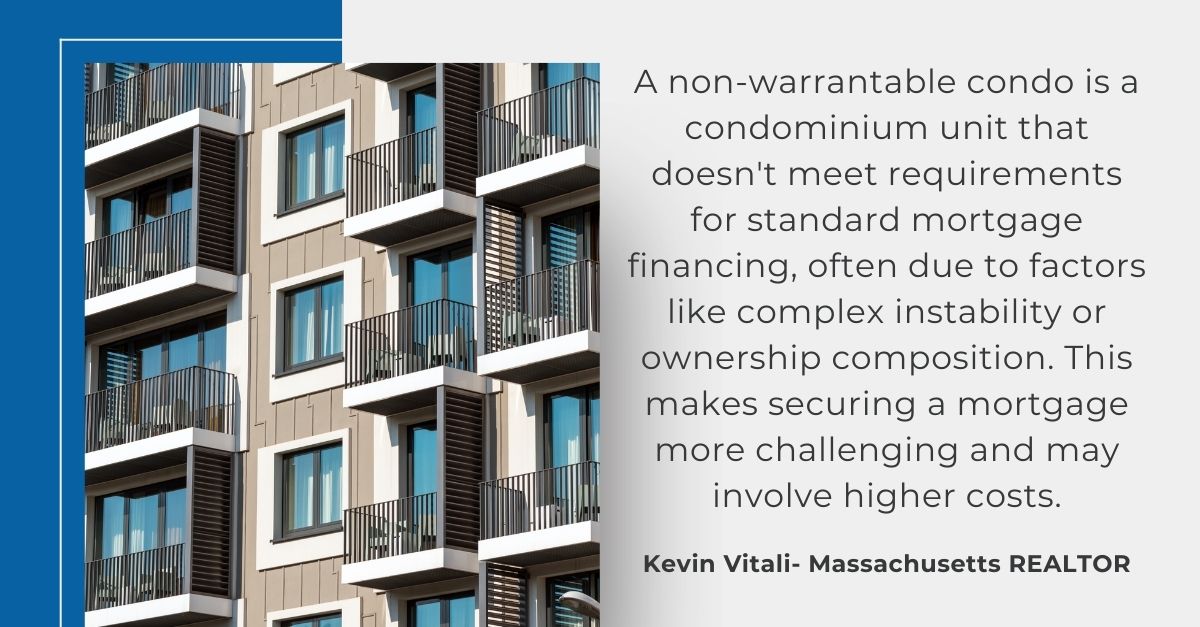 The risks of buying a non-warrantable condo in Massachusetts come with specific challenges when it comes to financing.
The risks of buying a non-warrantable condo in Massachusetts come with specific challenges when it comes to financing.
Non-warrantable condos do not meet eligibility criteria established by agencies like Fannie Mae, Freddie Mac, and the FHA, making it harder to obtain traditional loans.
However, alternative financing options, such as portfolio loans, can be explored. Specialized lenders offer these loans experienced in financing a condo that cannot be conventionally finaced.
These condos may have ongoing litigation, operational issues, or a high concentration of investor-owned units, which can impact lenders and affect resale value.
This article will dive into what a non-warrantable condo is, the challenges of financing and the inherent risks of purchasing one.
Jump To A Section....
Understanding Warrantable and Non-Warrantable Condos
When considering purchasing a condo in Massachusetts, it is essential to understand the difference between warrantable and non-warrantable condos. These terms refer to a condo’s eligibility to meet the criteria set by lending institutions.
Definition of Warrantable Condos
Warrantable condos are properties that meet the guidelines and requirements established by agencies such as Fannie Mae and Freddie Mac. These condos are considered low-risk investments for lenders due to their adherence to specific standards.
Warrantable condos typically have well-established management associations, stable financials, and many owner-occupied units. They are generally easier to finance and qualify for conventional loans with competitive interest rates.
Definition of Non-Warrantable Condos
On the other hand, this type of condo does not meet the criteria established by Fannie Mae, Freddie Mac, and other agencies. These condos present challenges in obtaining financing due to factors such as ongoing litigation, operational issues, high investor concentration, or failure to comply with occupancy requirements.
Non-warrantable condos are considered higher risk for lenders and may require alternative financing options.
Differences between Warrantable and Non-Warrantable Condos
- Ownership and Occupancy: Warrantable condos typically have most owner-occupied units, while unwarrantable condos may have more units owned by investors.
- Association Stability: Warrantable condos usually have well-established and financially stable associations with sufficient reserve funds. Non-warrantable condos may have less stringent association requirements or face financial instability.
- Financing Options: Warrantable condos can be financed through traditional lenders and qualify for conventional loans. Non-warrantable condos necessitate alternative financing options, portfolio loans, or specialized lenders.
- Litigation and Issues: Non-warrantable condos may be involved in ongoing legal disputes or face operational challenges, which can impact the marketability and value of the units.
Understanding the distinctions between warrantable and non-warrantable condos is crucial for buyers to make informed decisions regarding financing options, risks, and resale potential.
Proper evaluation and consultation with a knowledgeable real estate agent are recommended to navigate the complexities associated with them.
Financing Challenges for Non-Warrantable Condos
When it comes to financing non-warrantable condos in Massachusetts, there are several challenges that buyers may encounter.
Lack of Eligibility for Conventional Loans
These specific types of condos do not meet the eligibility criteria set by agencies like Fannie Mae and Freddie Mac. As a result, traditional lenders typically do not offer conventional loans for these types of condos. This lack of eligibility can make it more difficult for buyers to secure financing.
Alternative Financing Options for Non-Warrantable Condos
Fortunately, there are alternative financing options available for these condos. Buyers can explore options like portfolio loans offered by specialized lenders experienced in financing unwarrantable condominiums. These lenders evaluate each case individually and consider unique factors that traditional lenders may overlook.
Potential Risks and Considerations for Financing
Buyers of non-warrantable condos should carefully consider the potential risks associated with financing. While these condos may offer lower purchase prices and investment opportunities, they also come with higher interest rates, shorter loan terms, and potential resale challenges. Additionally, uncertainty may be related to the condo association’s financial stability and ongoing legal issues.
It’s essential for buyers to thoroughly assess these risks and weigh them against the potential benefits before deciding on financing a non-warrantable condo.
Overall, the lack of eligibility for conventional loans is a significant financing challenge for non-warrantable condos. However, alternative financing options and a thoughtful evaluation of potential risks can help buyers navigate these challenges and secure the necessary funding for their condo purchases.
FHA Loans for Non-Warrantable Condos
When financing non-warrantable condos in Massachusetts, one option to consider is obtaining a loan insured by the Federal Housing Administration (FHA). These loans provide certain advantages and considerations for buyers purchasing one.
Criteria for FHA Approval of Non-Warrantable Condos
For a non-warrantable condo to be eligible for FHA financing, it must meet specific criteria established by the FHA.
Some of the key factors considered include:
- Financial stability of the condo project: The FHA looks at the economic health and strength of the condo association to ensure its ability to maintain the common areas and fulfill its obligations.
- Occupancy rates: The FHA considers the percentage of owner-occupied units in the condo project, as a higher number indicates better stability and management.
- Compliance with homeowners’ association: The condo homeowners association must demonstrate compliance with applicable laws and regulations, including maintenance of appropriate reserve funds.
Meeting these criteria can increase the likelihood of obtaining FHA-backed loans for non-warrantable condos. Having FHA approval for a condo is always a significant benefit.
Benefits and Limitations of FHA Loans for Non-Warrantable Condos
There are several benefits and limitations associated with FHA loans for non-warrantable condos:
Benefits:
- Lower down payment requirement: FHA loans typically require a lower down payment than conventional loans, making them more accessible for buyers.
- Favorable interest rates: FHA loans often offer competitive rates, especially for borrowers with less-than-perfect credit.
- Flexible credit requirements: FHA loans may be available to borrowers with lower credit scores or less extensive credit histories.
- Assumable loans: FHA loans are assumable, which means that if you decide to sell your condo, the buyer may be able to assume your FHA loan, potentially making it more attractive to potential buyers.
Limitations:
- Mortgage insurance premiums: FHA loans require borrowers to pay mortgage insurance premiums, which can increase the overall cost of the loan.
- Loan limits: FHA loans have specific maximum limits, which may constrain borrowers looking to finance high-value non-warrantable condos.
- Property eligibility: Not all non-warrantable condos may meet the FHA’s criteria for financing, limiting the options available for buyers.
It is essential to carefully assess the benefits and limitations of FHA loans for unwarrantable condominiums to determine if this financing option aligns with your specific needs and circumstances.
Working with a Real Estate Agent for Non-Warrantable Condos
When purchasing a non-warrantable condo in Massachusetts, working with a knowledgeable Massachusetts REALTOR who understands the complexities and risks associated with these properties is crucial.
A skilled agent can guide you through the process, provide valuable insights, and help protect your interests.
Importance of a Knowledgeable Real Estate Agent
A knowledgeable real estate agent knows non-warrantable condos’ intricacies and unique challenges. They understand these properties’ financing limitations, potential legal issues, and market dynamics. Having an agent with expertise in condos that are not warrantable can significantly streamline the buying process and increase your chances of a successful transaction.
An expereinced agent deeply understand the criteria laid out by lenders and can help you navigate the financing options available for non-warrantable condos. They can also assess the financial stability of the condominium association and provide valuable insights into any ongoing litigation or operational concerns that may impact your investment.
With their expertise, you can make informed decisions and mitigate potential risks.
Finding an Agent Experienced in Non-Warrantable Condo Transactions
Finding a real estate agent experienced in non-warrantable condo transactions is crucial to ensure a smooth buying process. Here are some critical steps to help you find the right agent:
- Seek Recommendations: Ask for referrals from friends, family, or colleagues who have successfully purchased non-warrantable condos in Massachusetts. They can provide insights and recommend agents who have expertise in this niche market.
- Research Credentials and Experience: Look for agents who specialize in unwarrantable condos and have a track record of successfully closing such transactions. Review their credentials, certifications, and online presence to gauge their expertise and professionalism.
- Interview Multiple Agents: Schedule consultations with multiple agents to assess their knowledge, communication skills, and understanding of your specific needs. Ask relevant questions about their experience with non-warrantable condos and how they handle financing challenges.
- Review Client Testimonials: Read client testimonials and reviews to gauge the agent’s reputation and level of client satisfaction. Look for feedback related explicitly to non-warrantable condo transactions.
- Trust Your Gut: Ultimately, choose an agent who instills confidence, demonstrates a deep understanding of non-warrantable condos, and communicates effectively. Trusting your instincts is crucial in selecting the proper professional to guide you through buying.
Working with a real estate agent experienced in non-warrantable condo transactions will provide you with the expertise and support needed to navigate the complexities of purchasing these unique properties. Their guidance can help you make informed decisions and ensure a smoother buying process.
Strategies for Buyers of Non-Warrantable Condos
When considering the purchase of a non-warrantable condo in Massachusetts, buyers must implement various strategies to mitigate risks and make informed decisions. Here are some key strategies to consider:
Researching and Assessing the Condo Association’s Financial Stability
One crucial step is to thoroughly research and assess the financial stability of the condo association. This involves reviewing their financial statements, budget, reserves, and ongoing litigation or legal issues. A financially stable association will have adequate funds and a well-planned budget to handle unexpected expenses and adequately maintain the property.
Evaluating Potential Risks and Legal Issues
Buyers should also carefully evaluate any risks and legal issues associated with the non-warrantable condo. This includes reviewing any pending litigations, disputes, or conflicts within the association or with neighboring properties.
Assessing these risks can help buyers understand the potential impact on their investment and make informed decisions about the property.
Considering Resale and Investment Potential
Additionally, buyers should consider the resale and investment potential of the non-warrantable condo. Location, market demand, rental restrictions, and market trends should be considered. Buyers should assess whether the condo has the potential to appreciate, provide rental income, or attract future buyers if they decide to sell in the future.
By researching and assessing the condo association’s financial stability, evaluating potential risks and legal issues, and considering the resale and investment potential, buyers can navigate the challenges associated with non-warrantable condos more effectively.
These strategies can help buyers make informed decisions and minimize potential risks when purchasing a non-warrantable condo in Massachusetts.
Financing Options and Programs for Non-Warrantable Condos
Buyers have several options and programs when it comes to financing unwarrantable condos. These options cater to these types of properties’ unique challenges and requirements.
Portfolio Loans
Portfolio loans are a popular choice for financing non-warrantable condos. Specialized lenders with experience financing properties that do not meet traditional eligibility criteria offer these loans.
With portfolio loans, the lender considers the individual circumstances of the buyer and the property rather than relying solely on standardized guidelines. These loans often come with flexible terms, allowing borrowers to tailor the loan according to their specific needs and objectives.
Jumbo Loans
A jumbo loan can be a viable financing option for these condominiums that fall under the luxury category. Jumbo loans exceed the limits set by conventional loans and are designed to finance high-end properties.
While jumbo loans typically require a larger down payment and have stricter eligibility requirements, they offer the advantage of higher loan amounts, making it easy to finance luxury condos.
Bank Statement Loans for Self-Employed Buyers
Self-employed buyers interested in purchasing a non-warrantable condo can explore the option of bank statement loans. These loans evaluate the applicant’s financial situation based on their bank statements rather than traditional income verification methods.
Bank statement loans are suitable for individuals who may have difficulty meeting the strict income requirements set by traditional lenders. By considering their bank statements, lenders can assess the buyer’s ability to repay the loan and provide financing solutions tailored to their unique financial circumstances.
Financing options for non-warrantable condos are essential for buyers who want to invest in these properties despite the challenges they may present. From portfolio loans to jumbo loans and bank statement loans, various programs cater to the specific needs of buyers interested in these condos.
Consulting with specialized lenders and exploring these financing options can help buyers overcome the obstacles associated with these properties and make an informed purchasing decision.
Overcoming Financing Challenges for Non-Warrantable Condos
When it comes to financing non-warrantable condos, there are several challenges that buyers may face. However, strategies and solutions are available to overcome these obstacles and secure financing for your dream condo.
Working with Specialized Lenders
One critical approach to overcoming financing challenges is to work with specialized lenders. These lenders have experience financing non-warrantable properties and understand the unique complexities involved.
They can offer tailored loan options that suit the needs of buyers looking to purchase non-warrantable condos.
Addressing Loan Requirements and Eligibility
Addressing the specific loan requirements and eligibility criteria is essential for securing financing for a non-warrantable condo. Specialized lenders can guide buyers through the process, helping them understand and meet the necessary standards.
This may involve providing thorough documentation, demonstrating financial stability, and addressing potential concerns lenders might have.

Author Bio
Kevin Vitali is a Massachusetts REALTOR out of Haverhill MA that serves Essex County and Northern Middlesex County in Massachusetts. If you want to buy or sell a home, let me use my years of experience to get you the best possible outcome.
Feel free to contact me to discuss any upcoming moves. I am always happy to answer your questions
Call 978-360-0422 Email kevin@kevinvitali.com
Need help navigating the world of buying a condo? Let me help you with my 20+ years of experience.





